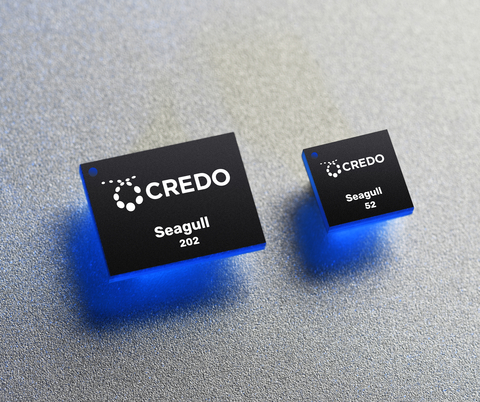New Seagull DSPs Deliver High Performance and Low Power with Integrated DML Drivers
Credo Technology Group Holding Ltd (NASDAQ: CRDO) today introduced two high-performance, low-power optical DSPs ICs; the single channel Seagull 52 and the quad channel Seagull 202. Credo designed these new Seagull DSPs to meet the requirements of the most demanding hyperscale and 5G applications by delivering higher bandwidths and low-latency variation combined with ultra-low power dissipation. Both devices come with the integrated directly modulated laser (DML) drivers critical to supporting high-density data center design and optical transport networks.
This press release features multimedia. View the full release here: https://www.businesswire.com/news/home/20220913005604/en/

Credo Targets Hyperscale Data Centers and 5G Networks with New Optical DSPs. New Seagull 202 and 52 DSPs Deliver High Performance and Low Power with Integrated DML Drivers (Photo: Business Wire)
“The continued global roll out of hyperscale data centers and 5G networks requires more fiber, more towers and more bandwidth with a view to minimizing power,” said Scott Feller, Vice President of Marketing at Credo. “These new additions to Credo’s Seagull product line will allow our hyperscaler and telecom customers to meet relentless capacity demands thanks to the reach distances supported, design flexibility enabled, and industry leading low power dissipation provided.”
Both products include a high-performance DSP engine. The DSP engine enables uncooled direct modulated lasers (DML) to be used in applications requiring industrial temperature, due to the increased non-linearities and signal impairments associated with the channel and optics of the engine. The DSP engine also enables use over an extended range of wavelengths in wavelength division multiplying (WDM) applications. The optical line side transmitters include integrated DML drivers with programmable laser currents to simplify module design. A number of test and debug features enable rapid bring-up, simplified lab and production testing, and reduced time to market.
About the Seagull 52:
The Seagull 52 is a versatile product that can be used as a bitmux or retimer in next generation QSFP28, DSFP, SFP-DD and SFP56 optical transceivers. In bitmux mode, the DSP is configured with two lanes of 25Gbps NRZ on the host side to one 53.125Gbps (26.5625GBd) PAM-4 lane on the line side. In retimer mode, Seagull 52 is configured as one lane of 53.125Gbps PAM-4 to one lane of 53.125Gbps PAM-4. Legacy data rates are supported for backwards compatibility.
Seagull 52 supports industrial temperatures of -40°C to +85°C and can be used in 5G wireless front, mid, and back haul, and high-density data centers.
About the Seagull 202
The Seagull 202 DSP is a full duplex product that can be used in next generation 4x50Gbps QSFP28 optical transceivers for high density data centers.
Availability
Samples of Seagull 52 and Seagull 202 are available immediately. Interested customers should contact sales@credosemi.com. All Credo product offerings are supported by evaluation boards, simulation models, characterization reports, reliability reports, design libraries and a complete set of supporting documentations.
To learn more about the Credo Optical products, go here.
View source version on businesswire.com: https://www.businesswire.com/news/home/20220913005604/en/
Contacts
Media Contact:
Diane Vanasse
diane.vanasse@credosemi.com
Investor Contact:
Dan O’Neil
dan.oneil@credosemi.com













